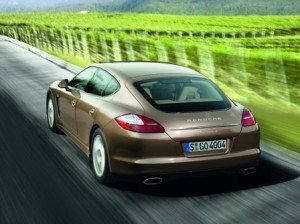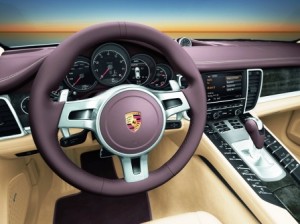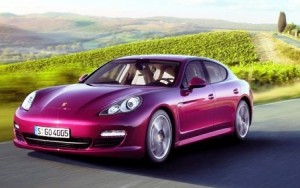Porsche Cars North America is adding two V6 models to its Panamera sedan line. The cars will debut globally at the Beijing Motor Show in April, and arrive at U.S. dealers this June.
The so-called entry-level sedans, Panamera and Panamera 4, are priced at $74,400 and $78,900, respectively. Porsche released no projected fuel economy figures.
It did boast, though, that these cars would be more fuel-efficient than the hyper-powered V8 models, the Panamera S, the Panamera 4S and the Panamera Turbo – 400 to 500 horsepower sports sedans, rated by the U.S. Environmental Protection Agency at 16 city and 24 highway; the turbo is 15/23.
A new Porsche V6 – and let me stress new as this is not the current Cayenne V6 – should easily be able to best this number, even though the weight of the four- door sedan will be an efficiency issue.
Such fuel economy and relatively high CO2 emissions levels are largely, if not entirely irrelevant, of course, to buyers of high-powered German cars; and German makers have a long history of paying the fines incurred – passed on to buyers – when they violated U.S. fuel economy regulations. They all have done it for decades, while Congress looked the other way.
However, this loophole is currently under scrutiny by industry critics and pressure groups, as the National Highway Traffic Safety Administration and the U.S. Environmental Protection Agency work out final fuel economy rules – and the methodology used to calculate them – which will lead to a 35.5 mile per gallon average in 2016. Passenger cars will need to average 42 mpg under the proposed rules. (To say that the auto company lobbyists are working this hard behind the scenes in pay-for-play Washington, DC, is an understatement.)
Porsche says that no Panamera sedan will be subject to a gas-guzzler tax. And we have no reason to doubt the storied engineering firm. Official U.S. EPA fuel economy figures will be announced closer to the on-sale date. Panamera will have the stop/start mode that the V8 models have, which shuts the engine off at idle, thereby increasing efficiency. Aside from Japanese hybrids, I think this is the only application of this advanced, fuel saving technology on the U.S. market.
The four-door Panamera was the real news last fall at the Frankfurt Auto Show when it debuted. (Click here for that story.) Panamera remains a real product bet in the depressed global economy. The car represents Porsche’s much debated, much delayed, fourth model line. A four-door was under consideration at Porsche more than two decades ago, but the conservative German maker eschewed a saloon and ultimately gambled on what became a successful investment in a truck – the Cayenne sport utility vehicle.
When Porsche finally announced it would build the brand’s first four-door passenger car four years ago, the discussions began anew as to whether this would be a “true” Porsche.
Thus far, global sales have been strong, belying the premises of the debate. By the end of last year, the new Panamera had already sold a total at least 5,000 copies, and total production is now well above 10,000 units for the four-door.
However, the delay also allowed smaller rival Aston Martin to prepare a similar offering, the four-door Rapide, which also debuted at Frankfurt.
Both Panamera and Panamera 4 will come with a 3.6-liter V6 with Direct Fuel Injection (DFI) engine, producing 300 horsepower and 295 lb-ft of torque. The Panamera transmits its power to the road via the rear wheels, while the Panamera 4 comes standard with “active” all-wheel drive. U.S. models will have a seven-speed, double-clutch gearbox as standard equipment.
These are vital to the health of the firm. In November, Porsche SE reported it lost (-€4.4) billion before taxes for the business year 2008/09, or operations for August 1, 2008 to July 31, 2009. Net loss was (-€2.52) billion for the 12 months. The loss was Porsche’s first annual deficit since 1994. It is projecting a slight increase in sales this year due to the Panamera global rollout. (Click here for that story.)
Last month, Porsche Automobil Holding SE’s annual meeting saw economic reality prevail over history, as board member Hans-Peter Porsche 69, retired from office and was immediately replaced by “His Excellency” Sheikh Jassim Bin Abdulaziz Bin Jassim Al-Thani, 31, as a representative of Qatar Holding LLC, Doha, on the supervisory board of the company. (Click here for that story.)
The changes came at the general meeting held in the Porsche-Arena in Stuttgart. Qatar’s sovereign wealth fund acquired a 10% voting stake in Porsche last year amid the turmoil of a reckless, highly leveraged and failed takeover bid of Volkswagen by Porsche that ultimately saw the ouster of Porsche chief executive Wendelin Wiedeking and chief financial officer Holger Haerter when Porsche couldn’t cover the loans as the global economy collapsed.
Volkswagen is now in the process of completely taking over Porsche – with borrowed money by way of watering the stock.



